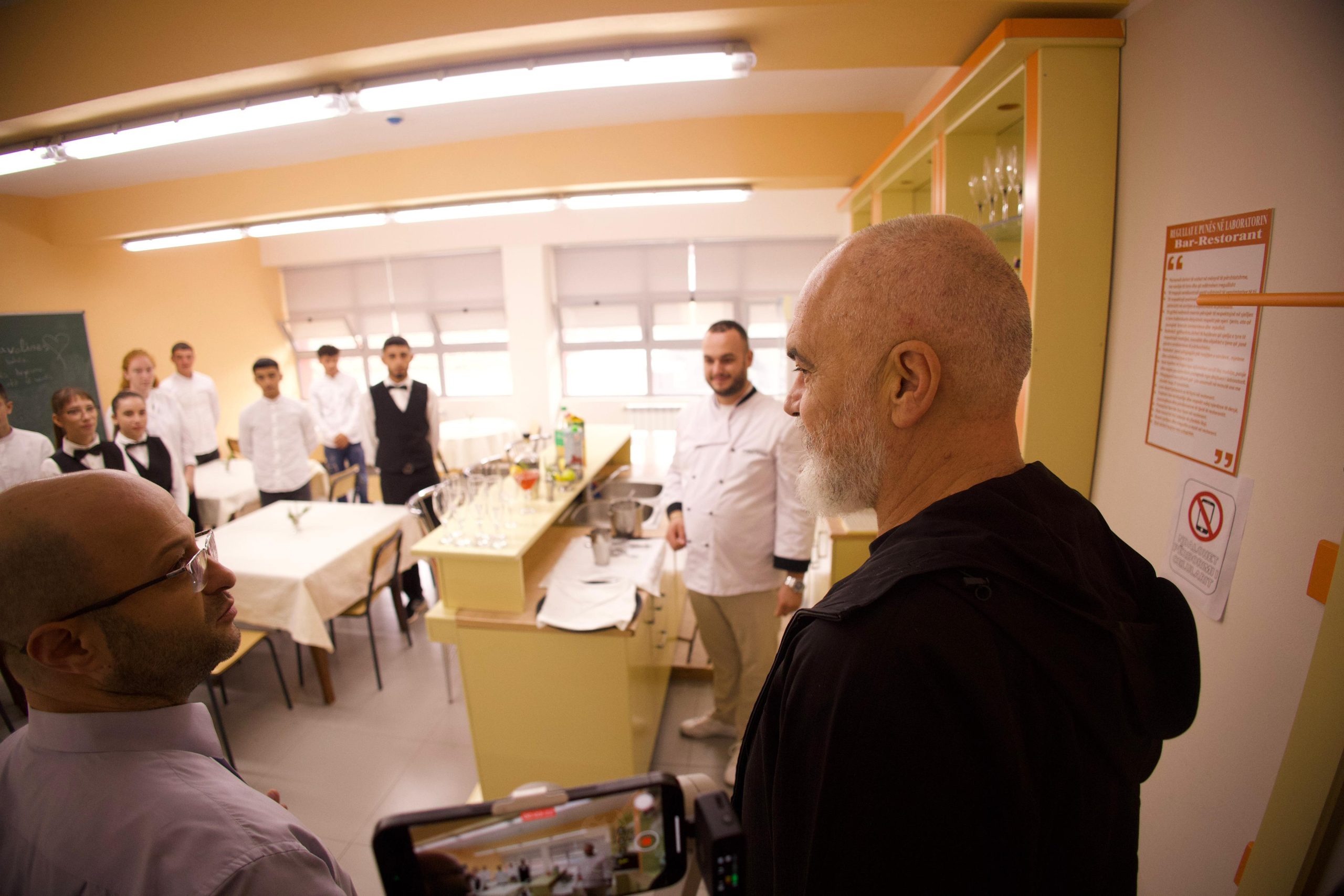Vocational education keeps attracting more students each year, representing a real opportunity for employment in a labor market that continuously demands skilled workers. Prime Minister Rama, accompanied by Blendi Gonxhja, the Minister of Economy, Culture, and Innovation and Arbjan Mazniku, the Minister of State for Local Governance, visited Elbasan’s Vocational School, where 1,400 students are currently enrolled.
During a conversation with the Prime Minister, the school director stated: “We’ve seen an 8% increase from last year, from 1,360 to 1,397 students. Meanwhile, the number of female students is also rising, partly due to the scholarships offered by the state. We believe that in the future, more will be needed with regard to the general education program.” The school offers a variety of programs that respond to the labor market’s needs, such as Hospitality and Tourism, Business Economics, Textiles and Clothing, Mechanics, Electrical Engineering, and more.
At the same time, the school’s dormitories are near completion. “We have finished the girls’ dormitory and are waiting to finish the boys’ dormitory. It’s a good project of the Albanian Development Fund, which is increasing the school’s capacity to become regional and attract students from Korça and Pogradec, increasing the number of students coming here. We believe that the dormitories will be ready and fully furnished by spring. Some parts are already completed, but everything will be ultra-modern, so that the students will feel at home,” said the mayor of Elbasan, Gledian Llatja.
About 300 companies cooperate with the school, providing practical learning opportunities for all students. “I just want to take a minute to remind you, so it can help teachers teach students to fully contract their salaries in the labor market and not fall prey to any form of informality or salary abuse. We need real contributions for the quality salaries they will receive and real contributions for their future. We need to educate them about their rights and the consequences of violating those rights today, which will affect their pensions tomorrow. It’s crucial to ensure that all these high government salaries that are being mentioned are accompained by guaranteed commitments, while in the private sector we need to work harder to achieve and protect them,” said Minister of Economy, Culture and Innovation, Blendi Gonxhja.
“I think the simplest way to explain this to everyone is that if they accept to work with entrepreneurs who break the law by declaring a lower salary and giving part of the payment in cash to avoid social security, they are essentially allowing the employer to unjustly take from their grandparents’ pensions. That’s the essence of it, because the social security payments go into the pension fund, which may seem irrelevant now, but it’s used to pay for our grandparents’ pensions. When it’s their turn to retire, other people will pay for it. That’s why we need more awareness, to demand full, clear, social security inclusive salaries, because it’s pointless to ask for an increase in pensions for our grandparents without first contributing to the system. Otherwise it’s pointless to say ‘increase my grandmother’s pension, increase my grandfather’s pension’ because their pension increases are directly linked to how much we all contribute to the system through Social Security. That’s the foundation. How does the pension go up? The other alternative is to raise taxes, which we’re already doing, because the Social Security fund is not covering the cost of pensions. In fact, it has a significant deficit, and we cover that gap with taxes. But to increase taxes further would be unfair to those who already pay both taxes and social security, because they would receive fewer benefits because the deficit created by those who don’t pay enough taxes or who evade social and health insurance has to be filled. The shameless declaration of a minimum wage of 400 euros for both regular workers and supervisors is openly criminal, and we will take much stronger measures against it. However, it must also become a matter of social consciousness and everyone must take part in this fight so that this country can improve and even the elderly can see economic growth in their pockets,” said Prime Minister Rama.
“It is also important to break the mentality that vocational education is a second-rate school,” the Prime Minister emphasized. “The good news is that this mentality is starting to break down, and people are realizing that vocational education offers an absolute guarantee that students will have a tool in their hands to secure employment. Moreover, those who choose vocational education are not excluded from going to university. If they want to go, they can, but unlike those who go to general education, they also have a trade that they can use to work during university or even after, possibly starting their own business,” Prime Minister Rama emphasized.







